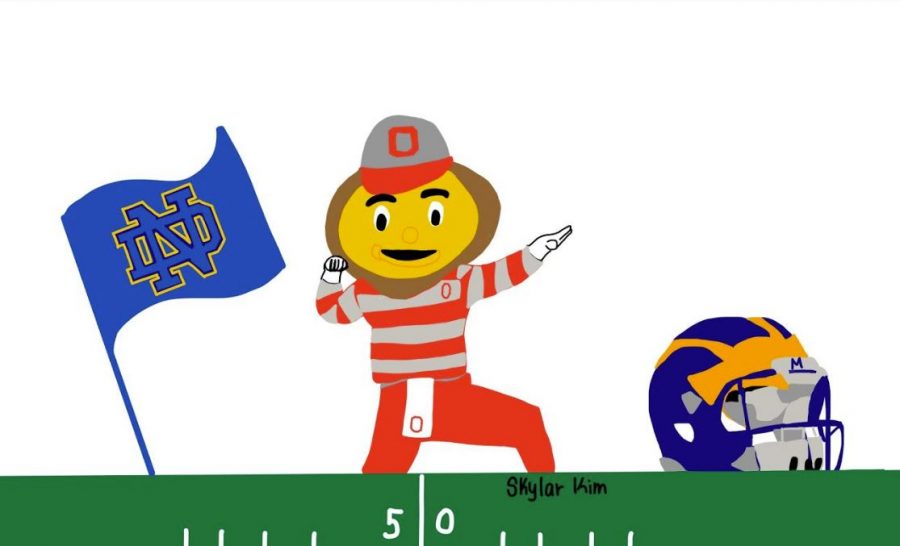Committee Controversies
New four-team playoff system sparks debate
Art by Skylar Kim
From 1998 to 2013, the college football season ended with the BCS National Championship. The two competing teams were based upon an average of several polls, including a poll voted on by the coaches. The teams ranked number one and two competed for the national championship. However, in 2014, the College Football Playoff was initiated.
The College Football Playoff consists of four teams competing for the national championship. There are two semifinal games every year that rotate among the Sugar Bowl, Rose Bowl, Peach Bowl, Fiesta Bowl, Cotton Bowl, and Orange Bowl. The winners of the two semifinals compete for the championship.
The purpose of the change to the playoff was to eliminate the disagreements caused by the selection of only two teams. However, the expansion to a four-team playoff has not eased controversies over which teams are deserving of the spots. The four teams are selected by the College Football Playoff Selection Committee.
The Selection Committee consists of thirteen members. They include former student-athletes, coaches, college administrators, journalists, and active athletic directors. To ensure impartiality, each committee member is asked to leave the room when their favorite team is discussed.
The Selection Committee chooses the four teams based on a specific set of criteria. They consider each team’s performance on the field, whether or not they won their conference’s championship, the strength of each team’s schedule, the head-to-head results of games between two teams being considered, and the results against common opponents of teams being considered. The end goal is to determine who the best four teams in the nation are.
Every year since the College Football Playoff started, there has been debate over the four teams chosen.College football fans question the criteria used to select the top four teams, as in previous years teams with a worse record made the playoff over teams with a better record. The committee defends such decisions by citing the strength of the teams’ schedules. They say that in a case such as this, the team with the worse record played tougher opponents. The team left out often argues that all they can do is beat the teams they play, and they should not be punished if their conference is not as strong as expected.
These arguments seem to exist no matter what system is used. They existed during the BCS era and still exist now. The problem lies in the fact that fans will always want their team to be able to play for the national championship. The College Football Playoff is designed to give the four best teams that chance. Some may disagree with the criteria, but this selection method does its best to ensure that the four best teams are chosen.
“I think the College Football Playoff does a good job. It’s supposed to be the four best teams, not just the teams with the best record,” said junior George Bowman. Many fans, like George, say that the current system provides the best product for fans to watch at the end of the year. The best teams from the year get a chance to prove their worth.
However, many have argued of late that the College Football Playoff should expand to eight teams to truly ensure that the best team has a chance to become champion.
“Expanding to eight teams would add more excitement and expand interest among fans. More teams would have a shot throughout the year, and teams would be able to survive a loss,” said junior Tyler Oberbroeckling. On the other hand, some will argue that there will still be controversy over the eight teams chosen.
Although no system is perfect, the College Football Playoff has been rather effective in doing its job. Its goal is to determine the best four teams and give them a shot to compete for the national championship. Overall, most fans would agree they have done so.
Your donation will support the student journalists of Saint Viator High School. Your contribution will allow us to purchase equipment and cover our annual website hosting costs.








